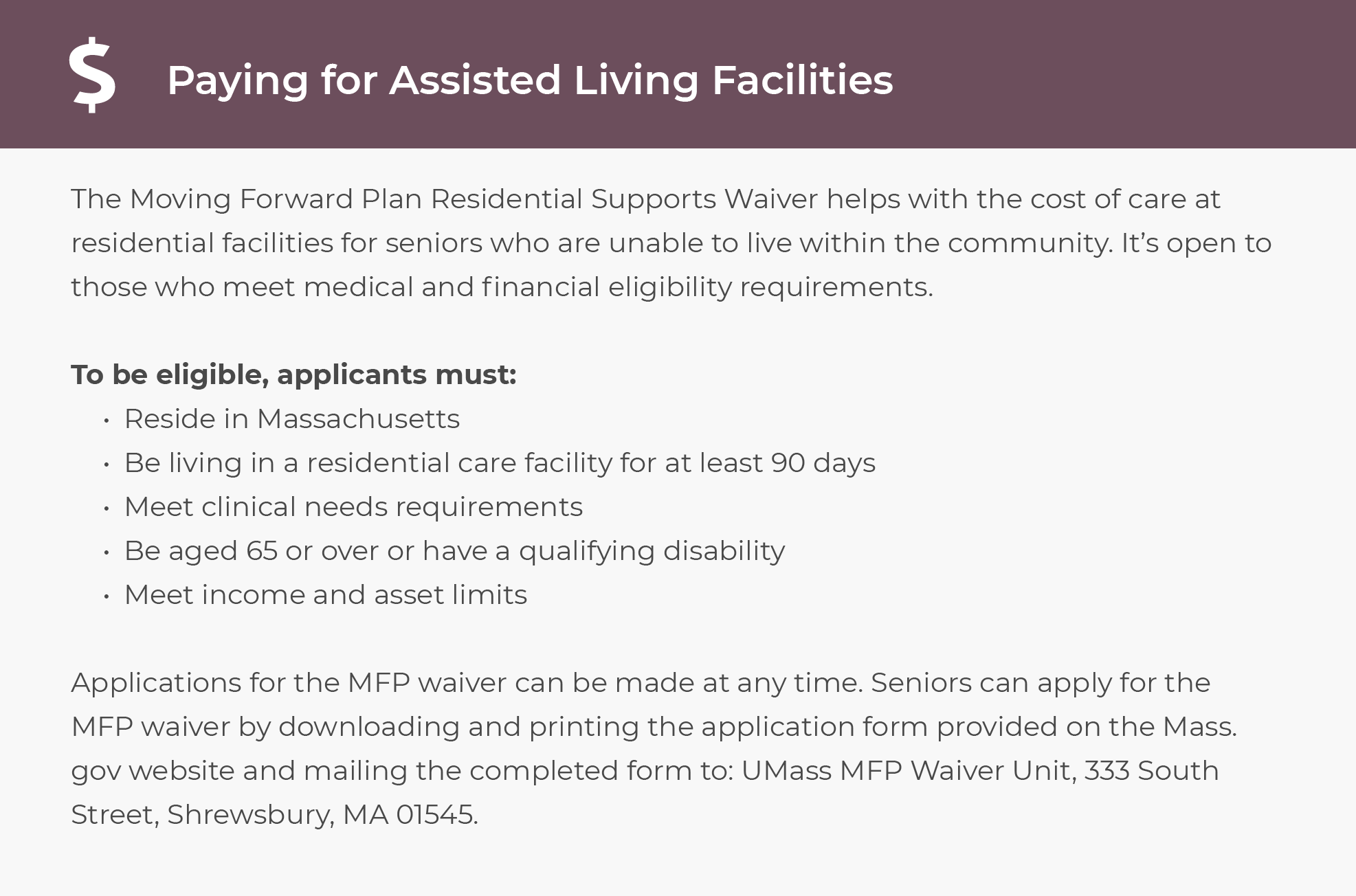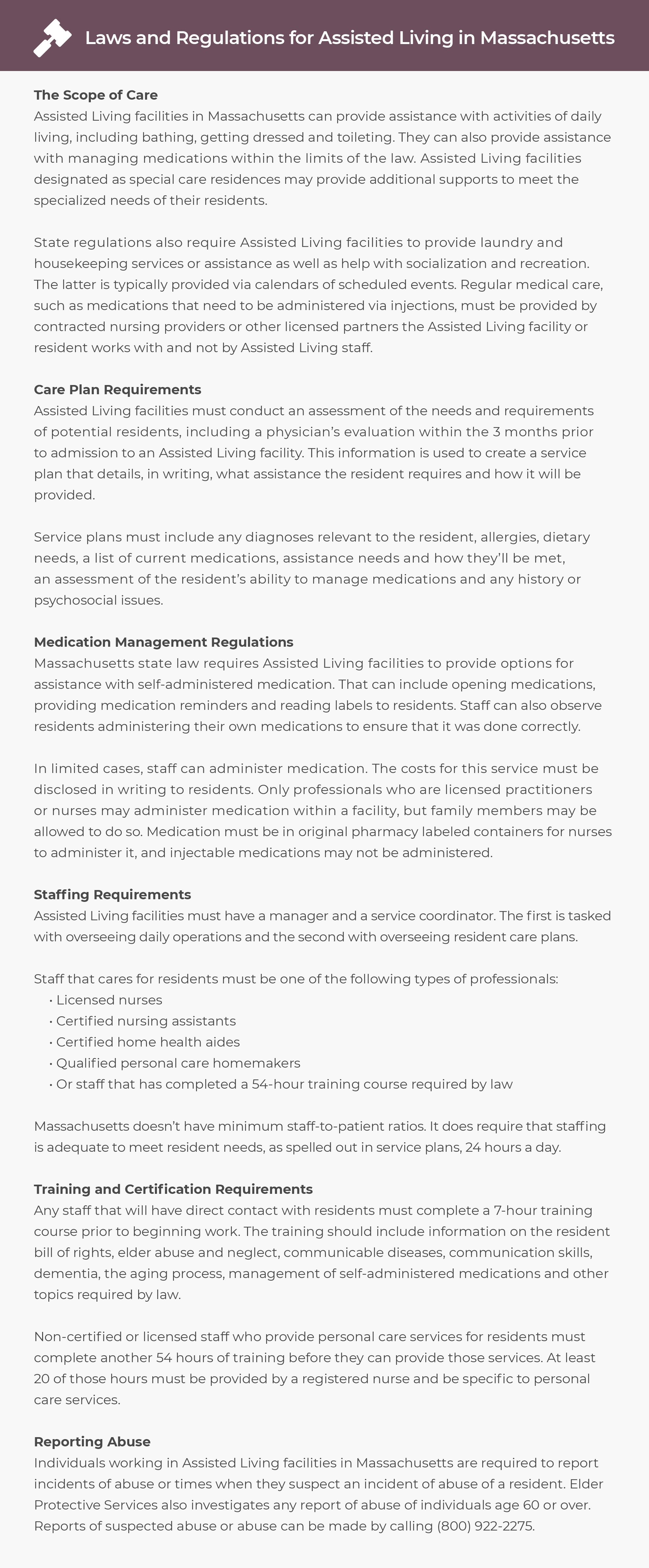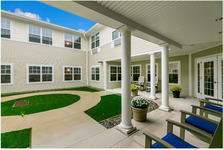Plymouth, MA, is perhaps one of the best-known cities in the country. This landing site of the Mayflower is rich in history and a popular tourist destination, not only for exploring the Colonial settlement, but also for the natural beauty of the area, especially in the fall, where visitors and residents alike pick apples, pumpkins and admire the fall foliage. Although the winters here are cold and snowy, the summers are sunny and warm. Beyond its place in American lore, Plymouth has many other things to offer elderly residents. Plymouth is about a 40-minute drive from Boston, which has an international airport for ease of visitation and world-class healthcare and other big city amenities. The crime rates in Plymouth are well below the national average, which may make elderly residents, about one in five of the town’s 62,000 residents, feel safer. In addition, SSI and public pensions are exempt from state income tax in Massachusetts, which seniors on a budget may appreciate.
Assisted living facilities are for seniors who want to live independently but have trouble with grooming, medication management and other routine activities. If you would benefit from light personal care within a friendly community of fellow seniors, assisted living might be for you. The monthly cost of assisted living in Plymouth is $7,000, a somewhat higher price than the Massachusetts average of $6,500.
Continue reading for more information about assisted living in Plymouth. Our guide covers assisted living costs, ways to pay for assisted living and community resources for residents of assisted living facilities.
Hundreds of thousands of American seniors utilize assisted living, a figure that is only growing. For these seniors, assisted living combines residential housing,assistance in daily activities, and some healthcare. These communities also strive to provide an atmosphere that is comfortable and engaging for their residents… Read More >
COVID-19 restrictions and rules for Assisted Living Facilities are typically set by the state – to see the rules in your state, you can read our guide to Assisted Living in Massachusetts. Keep in mind that there may be other policies that communities put in place to protect their residents, so you should contact your local community for more information. Additionally, you can contact your local Area Agency on Aging to learn more – find contact information here.
The general cost is $7,000 per month for assisted living in Plymouth, according to Genworth’s 2021 Cost of Care Survey, a rate that varies depending on location, amenities and services.
The $7,000 fee for assisted living in Plymouth is only slightly more expensive than the statewide norm of $6,500 per month. That said, Plymouth seniors pay significantly more than the national average of $4,500 monthly.
Assisted living facilities along the Massachusetts coast are the priciest in the state, with inland cities offering more affordability. Fees in the small coastal town of Plymouth ($7,000) are similar to the larger port city of Boston ($6,819) just north. Payments drop considerably as you travel to mid-sized cities in central Massachusetts, such as Worcester ($5,685) and Springfield ($5,048). The least expensive assisted living care in the state is in Pittsfield ($2,084) near the New York-Massachusetts border.
Note: Data for Plymouth was unavailable, so data for the nearest city, Barnstable Town, was used instead.

Since not everyone can afford to pay for assisted living out-of-pocket, it’s important to find alternative methods to help make assisted living more affordable. Some of these options include:
For more information about your options for making assisted living more affordable, visit our guide to Assisted Living in Massachusetts.
| Contact | Description | |
| Old County Elder Services | (508) 584-1561 | This agency protects the needs of the elderly, including supporting elder rights and preventing unnecessary institutionalization. Other programs help area seniors maintain good health and retain their independence. |
| The Nathan Hale Veterans Outreach Center | (508) 224-0100 | This is a local nonprofit organization that provides services to veterans, including transportation to the Plymouth County VA clinic. There is also a social center with sponsored lunches, chair massage, educational programs for veterans and help with securing survivor benefits. |
| MassMatch | (617) 204-3851 | Seniors and those with a qualifying disability may secure loans for durable medical equipment through this program. Equipment includes TTY and communications equipment, walkers, manual wheelchairs and toileting equipment. |
| South Coastal Counties Legal Services (SCCLS) | (508) 586-2110 | This is a nonprofit organization that provides free legal aid for the elderly and those who meet income eligibility guidelines. Multilingual staff is available. Services include advice on and cases of housing law, family law, government benefits including Social Security disability, elder law, education law, and consumer law. |
| Greater Attleboro Taunton Regional Transit Authority (GATRA) | (508) 732-6010 | Seniors and those with a qualifying disability may receive discounted fares for the local public transit system. Shuttle service and handicapped transit available by request. |
| Plymouth Center for Active Living | (508) 830-4230 | This senior citizen’s center offers programs for the elderly including ID cards to receive senior discounts and discounts on public transportation fares, gentle exercise classes, nutritional support, legal assistance, financial planning and help to secure government benefits. |
| Assisted Living Ombudsman | (617) 727-7750 | Long term care residents and their families receive assistance for their concerns about assisted living facilities. Ombudsman services investigate these complaints. Representatives also advocate for the rights of the elderly at the local and state levels. |
Assisted Living Facilities in the Plymouth area are required to follow a set of rules and regulations that are determined at the state level. For an overview of those rules and regulations, see the information below. For more specific information, talk with your local community or Area Agency on Aging.












